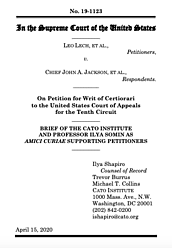Leo and Alfonsia Lech owned a home in Greenwood Village, Colorado where their son John lived. In early June of 2015, a shoplifter who was fleeing from the police chose the house at random to hide from the police. When the police arrived, they discovered that the shoplifter was armed and dangerous. Flushing him out of the house required two gas-canisters, breaking down the front and back doors, and blowing holes in the walls and windows. The shoplifter was captured, but the home was uninhabitable. This case is about who covers the costs of building a new house, the public who were protected from a violent criminal, or the innocent family that lost their home.
There’s an old saying, “you break it, you buy it,” but that apparently doesn’t apply in Greenwood Village. The city offered only temporary living expenses while the Lech’s paid to rebuild. The Lech’s sued for compensation under the Takings Clause of the Fifth Amendment, which says the government may not take private property “for public use, without just compensation.”
The district court denied Lech’s claim, and the Tenth Circuit affirmed the district court. The Tenth Circuit held that the destruction of property by police is different than when the government takes a house to, say, build a road. Taking property to build roads and schools are classic eminent domain cases, the court said, but the police destruction is just, well, luck of the draw. Because the Lech’s property was destroyed while trying to protect the health, safety, and welfare of the citizens, no compensation was owed. Essentially, the Tenth Circuit created an exception to the Takings Clause that historically has not been recognized.
Represented by our friends at the Institute for Justice, the Lechs have petitioned the Supreme Court to hear their case. Cato and Professor Ilya Somin of George Mason University’s Antonin Scalia Law School have filed a brief in support. We argue that the Tenth Circuit’s police-power exception conflicts with the history of the Takings Clause. There should be a remedy for innocent bystanders who lose property to destructive police tactics “for the public good,” especially given the militarization of police over the past decades.
Fundamentally, the Takings Clause means, in the words of the Supreme Court, the government cannot force “some people alone to bear public burdens which, in all fairness and justice, should be borne by the public as a whole.” The Supreme Court has often required the government to compensate the owners of physically taken or destroyed property, such as wagons commandeered for the Mexican-American War or land flooded when the government builds a dam. But the Tenth Circuit relied heavily on a case from 1887, Mugler v. Kansas, where a brewer sued for the loss of value in his property after the state banned alcohol. There the Supreme Court ruled that no compensation was owed. In that case, however, the property itself—the beer and the equipment to produce it—was considered noxious. But the Lechs are entirely innocent, and their property only became “noxious” after a criminal chose to hide in it.
Both the history and spirit of the Takings Clause show that the Lechs should be compensated for their lost property. In some sense, they did the people of Greenwood Village a favor by sacrificing their property to catch a criminal, and they should receive compensation. If the government breaks it, they should buy it.





